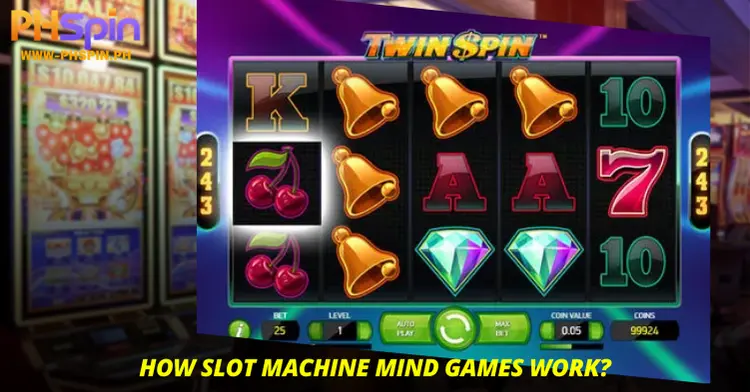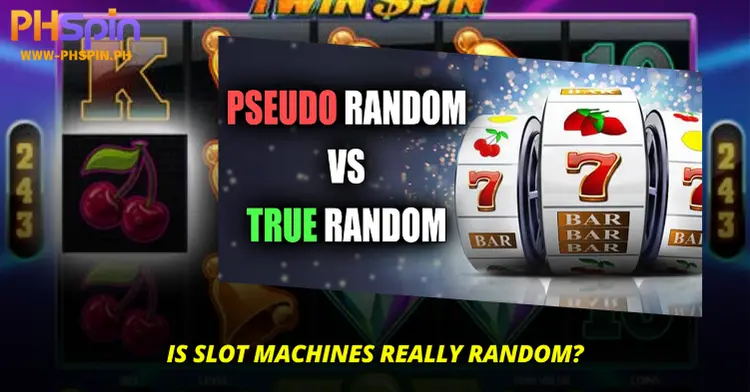Do slot machines mind games with gamblers? Extravagantly decorated with flashing lights, dynamic sounds, and appealing game plays, slot machines have kept players around the world mesmerized and made them appear as uncomplicated gambling games.
Beneath this attractive veneer of slot machines, however, are hosts of mind games these one-armed bandits use to maintain gamblers engaged in play, entertained, and spending by the use of various psychological principles. Slot machines have many mechanics and strategies embedded in their designs that appear to tap into deep, intricate areas of human psychology.
Knowing these tactics empowers a player with essential knowledge about the intentional design fueling these games. Let’s find out with PHSPIN.
How Slot Machine Mind Games Work?

Slot machines are designed to take advantage of various psychological methods and techniques that create appealing, often addictive, experiences. Most players have little idea about the powerful and often subtle ways in which slot machines manipulate behavior to encourage longer playtimes and increased spending.
Variable Reward Schedules
One of the central methods that slot machines use is variable reward schedules things that one would not predictably win. It is much like what B.F. Skinner, this famous psychologist, termed the reinforcement pattern. In the case of slot machines, wins are given at irregular intervals, which builds anticipation in the minds of players to keep them playing.
The thrill of the unpredictability of the next possible win keeps the players on their toes, anticipating a pay-out. This means that this will result in longer playing sessions and more game engagement.
Losses Disguised as Wins (LDWs)
The slot machines very often use “losses disguised as wins”. These are instances when a player’s spin doesn’t really gain their total bet back, but the game receives it with flashing lights and sounds. A typical case would be a situation whereby a player makes a $1.00 bet and gets $0.50 in return.
The machine may still rejoice with congratulatory sounds. This reinforcement creates an illusion of winning, thus making the players feel successful when the house is actually slowly siphoning money away from them.
Near Miss Effect
The near-miss effect is another psychological tactic used in slot machines mind games. Near misses are those instances when symbols come so close to actual alignment, leaving the player with the impression of having “just missed” that big win. The near-miss effect is extremely effective in slot machines as it instills in the player a drive to undertake successive attempts in trying to ensure the next spin will yield a positive result.
Visual and Auditory Stimuli
Avid graphics and thrilling sounds mark the playing environment of slot machines. Flashing lights, celebratory sounds, and theme-related music drive the points of winning and build an overall exciting environment for every spin. The celebratory nature of the stimuli-even in the case of losses makes the player feel a win could just be around the bend and thus encourages further play.
The Psychological Impact of Slot Machines Mind Games
These cognitive biases in decision-making and self-control are used to the advantage of slot machines’ design. Here’s how these tactics affect players:
- Optimism Bias: Optimistic bias refers to the fact that players tend to overestimate the probability of winning, especially when losses are framed as wins or near misses. Optimism bias increases the belief that a win is just around the corner and pushes players for continuation despite loss.
- Gamblers’ Fallacy: Gamers fall into the gambler’s fallacy, thinking that a win is “due” after sequences of losses. Slot machines play on this fallacy by providing a nonpredictive pattern of wins and losses to urge players onward in their bets to “win back” losses.
- Endowment Effect: The moment players invest time and money in one slot machine or another through the games played, an element of ownership leads to difficulty in simply walking away. Another factor the slot machines make use of to keep the engagement going is through what’s called the endowment effect the attachment formed to the game itself.
Is slot machines Really Random?

Yes! Slot machines make use of something called a Random Number Generator (RNG). This RNG is some sort of special algorithm, which shuffles numbers all the time-even when nobody is playing. Every time you press “spin”, the RNG picks a number that decides which symbols show up on the screen. Unlike in movies, when you always see somebody “almost win,” each spin is an independent event. The outcome of your last spin has zero impact on the next one!
Can You Predict the Outcome?
Not a chance! Slots are designed to be random. The RNG does millions of calculations per second, and by the time you’ve pressed that button, this outcome is already set. So, there’s no pattern, no “hot” or “cold” machine, and certainly no way to “beat” the system. Every spin can be as random as flipping a coin.
What About Runs of Wins?
Even though at times it might feel that some days are luckier than others, it’s all a matter of odds. In thousands of spins, the slot machines will return, or pay back, part of the money inserted into them, known as RTP or Return to Player. Still, in the short term, results can fluctuate hugely. That’s why you might see a lucky streak… followed by a few losses. Remember, it is total chance, so anything can happen!
So, Where’s the Fun Part?
It’s the thrill! It is the fact that every spin is an excitement the unpredictability. Well, it’s that thought that perhaps this very spin could bring the jackpot.
Recognizing the Slot Machines Mind Games
By understanding the concept of slot machines mind games, one will be in a position to know when such psychological gimmicks influence behavior. Realizing how all these design features can affect players should provide them better opportunities to set theirlimitationsn, understand how these games can manipulate responses, and approach slot play with informed caution.

